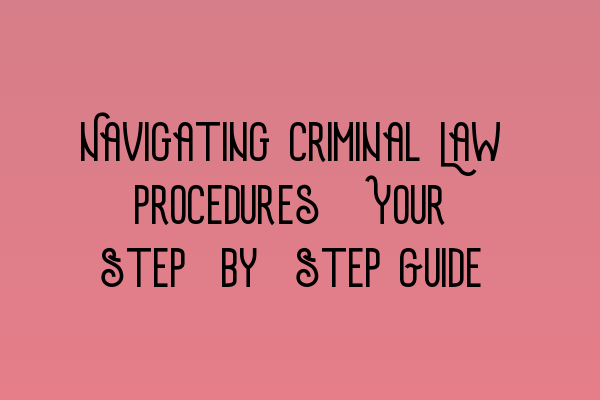Navigating Criminal Law Procedures: Your Step-by-Step Guide
Welcome to SQE Criminal Law & Practice Law UK, your trusted source for legal information and guidance. In this comprehensive guide, we will walk you through the various steps involved in navigating criminal law procedures in the UK. Whether you are a law student preparing for the SQE exam or a legal professional seeking a refresher, this guide is designed to provide you with a clear understanding of the criminal law process.
Step 1: Arrest and Detention
The first step in any criminal case is the arrest and detention of the suspect. This is typically carried out by the police based on reasonable suspicion of their involvement in a criminal offense. To learn more about the arrest and detention process, check out our article on SQE 1 Practice Exam Questions.
Step 2: Investigation
Following the arrest, a thorough investigation is conducted to gather evidence and build a strong case. This may involve interviewing witnesses, collecting physical evidence, and analyzing forensic reports. For comprehensive preparation on investigation techniques, consider our SQE 1 Preparation Courses.
Step 3: Charging
If there is sufficient evidence, the prosecuting authority decides whether to charge the suspect with a specific criminal offense. The decision to charge is based on the legal standards and requirements. Brush up on your knowledge of charging procedures with our SQE 1 Practice Mocks FLK1 FLK2.
Step 4: Court Proceedings
Once the suspect has been charged, the case proceeds to court. This is where the actual court proceedings take place, including arraignment, pre-trial hearings, trial, and sentencing. To enhance your understanding of court procedures, explore our SQE 2 Preparation Courses.
Step 5: Sentencing and Appeals
If the defendant is found guilty, the court proceeds with the sentencing stage, where a appropriate punishment is determined. It is important to note that defendants have the right to appeal their conviction or sentence. Familiarize yourself with the SRA SQE Exam Dates to ensure you are well-prepared for the SQE assessment.
By following these steps, you will have a better understanding of the criminal law procedures in the UK. If you have any additional questions or need further assistance, please do not hesitate to reach out to our team at SQE Criminal Law & Practice Law UK. We are here to support you!
Good luck with your legal studies and SQE exam preparation!
